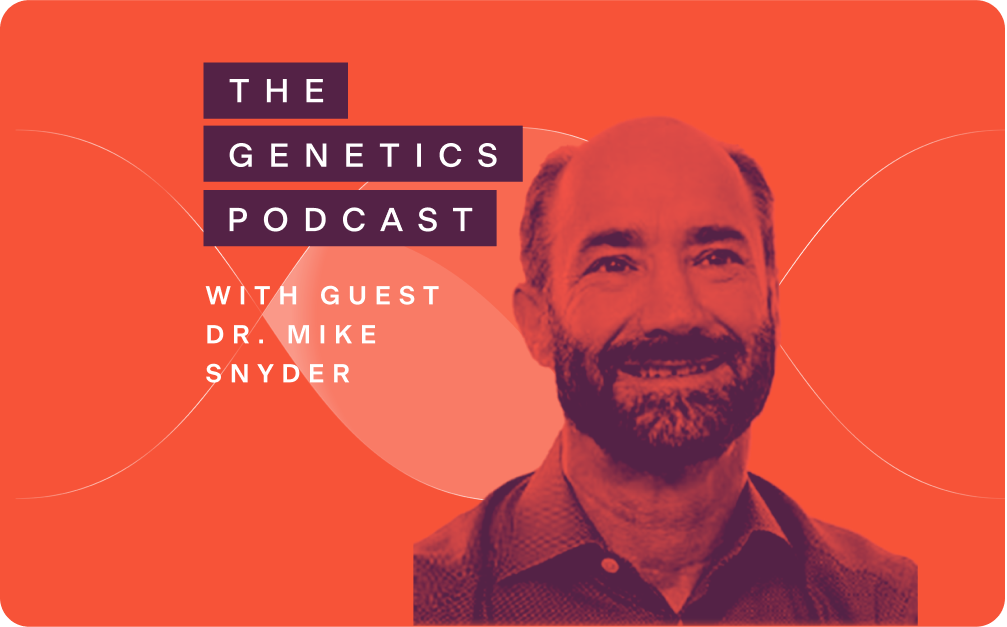Podcast recap: Exploring the future of health monitoring with Dr. Mike Snyder

On last week's episode of The Genetics Podcast, host Patrick Short was joined by Dr. Mike Snyder, Director of the Center for Genomics and Personalized Medicine at Stanford University. Known for his work in multiomics and personalized health monitoring, Dr. Snyder shares his career journey and discusses his unique approach of using himself as the first participant in his own studies. Their conversation covers everything from the future of healthcare to the potential of wearables and multiomics data in predicting illness before symptoms show.
Beyond the study of single genes
Dr. Snyder’s journey into multiomics began when scientists were mostly focused on the study of single genes. But as he progressed in his career, he realized that understanding the broader picture of how multiple genes and proteins work together was really the key to advancing both biology and medicine. This led him to research further into multiomics—combining data from genomics, proteomics, metabolomics, and other fields—to uncover new insights into human health.
The power of wearables in health monitoring
Since joining Stanford, Dr. Snyder's focus has shifted to using big data to tackle medical problems. One of the most exciting parts of Dr. Snyder's work is the use of wearables, such as fitness trackers and glucose monitors, to monitor health in real-time. During the episode, he talks about how wearables can provide insights on health at a low cost, detecting illnesses like Lyme disease and even viral infections like COVID-19. The key, he says, is understanding each person's baseline data and detecting changes that might signal a problem.
Dr. Snyder also recounts how his own smartwatch alerted him to a pre-symptomatic Lyme disease infection, a discovery that eventually led to the development of algorithms to detect illness early based on heart rate changes.
Reimagining the diagnosis and treatment of diabetes
Dr. Snyder’s work has extended to diabetes research, particularly exploring how continuous glucose monitoring can reveal hidden metabolic issues in people who may not even be diagnosed as diabetic. He explains how traditional tests, such as fasting glucose or hemoglobin A1C, may miss early signs of diabetes. His research shows that many seemingly healthy individuals experience significant glucose spikes, much like those seen in diagnosed diabetics, which could have long-term health consequences.
As an example, Dr. Snyder's own genome predicted his susceptibility to type 2 diabetes, and through detailed health monitoring, he was able to detect the condition early and manage it effectively. This led to his belief in "precision diabetes"—the idea that understanding the specific cause of a person’s diabetes can lead to more effective, individualized treatments.
The barriers to scaling health monitoring
Despite the clear benefits, Dr. Snyder acknowledges that cost and infrastructure are the major barriers to scaling personalized health monitoring. His research projects are expensive, but he believes the solution lies in research and scaling through private companies. For instance, he co-founded Q Bio, a company that offers advanced health assessments, including whole-body MRIs, to identify potential health issues early. He argues that although such services are currently expensive, as more people adopt them, costs will come down.
Monitoring mental health
Dr. Snyder singles out mental health as one of the most significant areas lacking effective biomarkers at the moment. "We don't have good markers for mental health—depression, anxiety—right now it's largely done through surveys, which is not ideal," he says. He believes that developing reliable digital and biochemical markers for mental health will be a game-changer in the future.
In addition to mental health, Dr. Snyder is also focused on improving early cancer detection. While technologies like cell-free DNA testing are currently showing promise in research, he believes they can be improved with more precise markers and better integration of data from multiple sources.
A vision for the future: Prevention over cure
Dr. Snyder advocates for a shift in healthcare from reactive to proactive, with a focus on prevention. His goal is for health monitoring to become the norm, allowing individuals to detect and address health issues before they develop into serious conditions. "We need to shift from sick care to healthcare," he emphasizes, stressing that continuous health tracking can extend not only lifespan but also health span.
Listen now:
